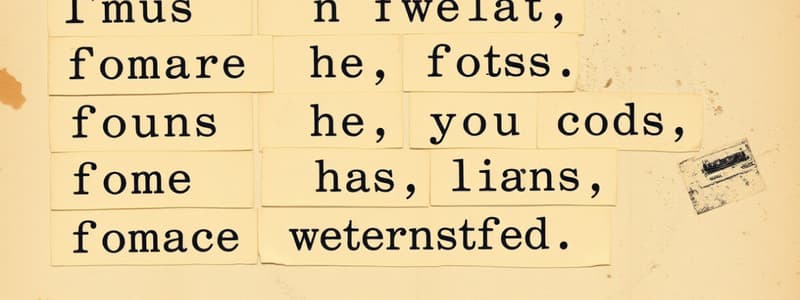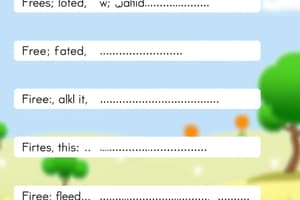Podcast
Questions and Answers
What do you want to do?
What do you want to do?
play
What do you like?
What do you like?
animals
What should you do with the toys?
What should you do with the toys?
put them away
Who drank the juice?
Who drank the juice?
Who found a lizard?
Who found a lizard?
What color is the ball?
What color is the ball?
How many cats do you have?
How many cats do you have?
What should you pass?
What should you pass?
Where did the birds fly?
Where did the birds fly?
What did the dog do?
What did the dog do?
What did she do?
What did she do?
What did the girl do?
What did the girl do?
What did she eat?
What did she eat?
What should you do with the window?
What should you do with the window?
Who made dinner?
Who made dinner?
Who is nice?
Who is nice?
What do you like playing?
What do you like playing?
Do you know Mason?
Do you know Mason?
What do you want?
What do you want?
How is the sun?
How is the sun?
Do you like broccoli?
Do you like broccoli?
What should you do with your hands?
What should you do with your hands?
What did she drink?
What did she drink?
Who is your friend?
Who is your friend?
How do you feel?
How do you feel?
What does her dog like?
What does her dog like?
How is your teacher?
How is your teacher?
How is the book?
How is the book?
When is your birthday?
When is your birthday?
What does she like eating?
What does she like eating?
Flashcards are hidden until you start studying
Study Notes
Four Word Sentences Overview
- Sentences often consist of four essential words to convey clear meaning.
- These sentences can express desires, actions, observations, and inquiries.
Sentence Examples and Meanings
- "I want to play." expresses a desire for an activity.
- "Do you like animals?" poses a question about preferences.
- "Put the toys away." is a directive to tidy up.
- "Danny drank the juice." describes an action taken by a specific person.
- "Sarah found a lizard." indicates discovery and excitement.
Descriptive Statements
- "The ball is red." offers a clear description of an object's color.
- "I have three cats." shares information about ownership and quantity.
- "Please pass the ketchup." is a polite request for a condiment.
- "The birds flew south." depicts seasonal animal behavior.
Actions and Social Interactions
- "The dog ran away." illustrates an escape or loss of a pet.
- "She sang a song." highlights a performance or artistic expression.
- "The girl went dancing." indicates participation in a social activity.
- "She ate french fries." details a common food choice.
Requests and Instructions
- "Please close the window." serves as a polite instruction for action.
- "My grandma made dinner." credits a family member for a meal.
- "My aunt is nice." conveys a positive characteristic of a relative.
Preferences and Likes
- "I like playing soccer." reveals a personal interest in a sport.
- "Do you know Mason?" inquires about acquaintance with a person.
- "I want a candy bar." expresses a craving for a specific treat.
- "The sun is hot." describes a weather condition.
Healthy Eating Considerations
- "Do you like broccoli?" asks about a health-conscious food preference.
- "Please wash your hands." emphasizes hygiene importance.
- "She drank orange juice." showcases a choice of a healthy beverage.
- "Lucy is my friend." affirms a social connection.
Daily Experiences
- "I am so tired." expresses fatigue, possibly related to daily activities.
- "Her dog likes bones." reveals an animal preference and behavior.
- "My teacher is friendly." describes a positive interaction in an educational setting.
- "The book is interesting." conveys engagement with reading material.
Celebratory Events
- "My birthday is tomorrow." excitedly announces an upcoming personal celebration.
- "She likes eating bananas." highlights a food preference related to health.
Studying That Suits You
Use AI to generate personalized quizzes and flashcards to suit your learning preferences.




